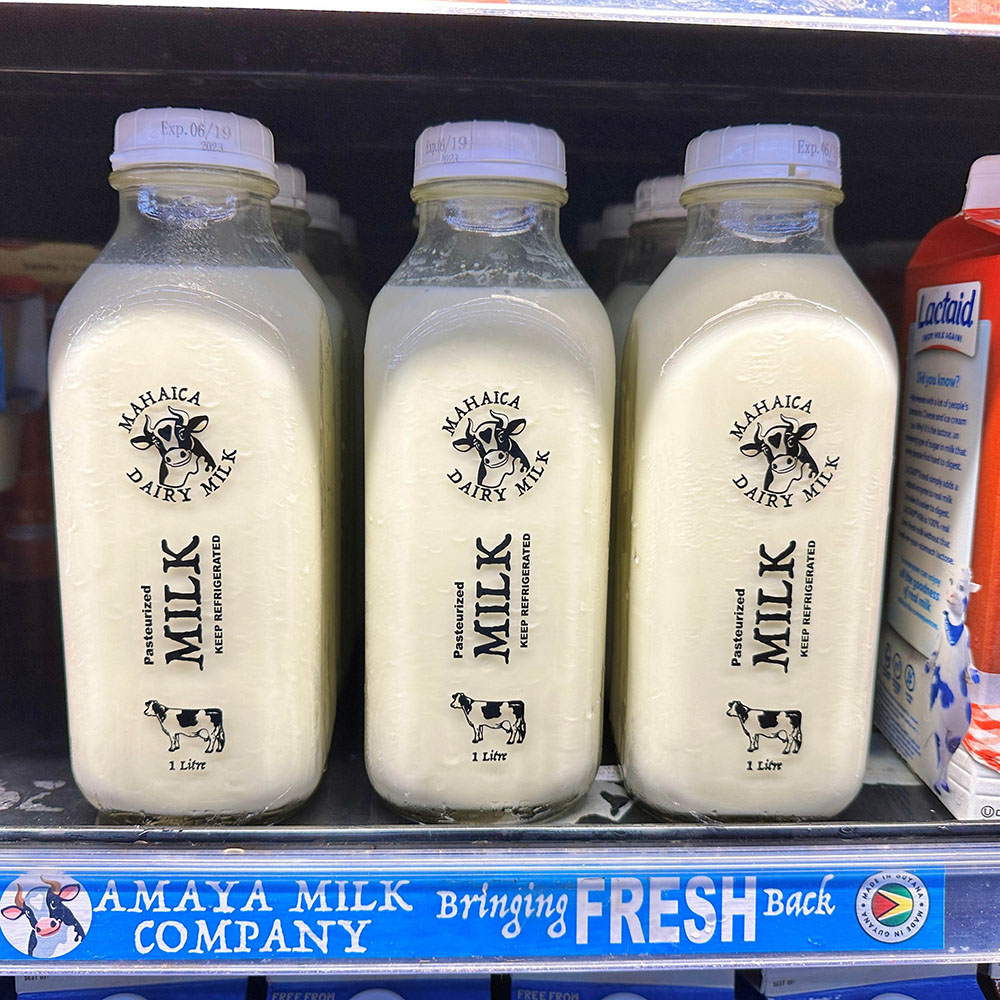The Amaya Milk Company is appealing to its customers for understanding as its milk products are currently not available on supermarket shelves due to a shipping glitch with its bottle supplier.
However, with a small air shipment due this week, there will be a limited supply until the bulk sea freight shipment arrives in time for Christmas, CEO of the company, Omkaar Sharma, assured.
“We have had an issue where our Canadian bottle supplier shipped us the incorrect sizes and without our branding. This left us without any containers to store the milk. They have since sent us a small air freight that will allow us to produce at a reduced capacity until the correct bottles and full shipment of correct bottles get here via sea freight,” Sharma told the Sunday Stabroek in an interview.
He was asked for an update after customers began expressing concern that the product was not on any of the supermarket shelves they had checked in the city.
Sharma responded that there was indeed an issue, but it had to do with the company not being able to access the requisite bottles that had been ordered.
He informed that the company was notified of the error and an air freight was due but that “the sea freight left Canada two weeks ago” and he expects that “we would have that in five weeks, max and in time for Christmas, we hope.”
In June of this year, the company had announced that its milk could be found at Mattai’s Food Market, Chand’s Service Station (Shell Gas Station) Ogle, Massy Megastores, Coss Cutters, FreshCo, and FoodMaxx supermarkets, with others to be added.
“I am extremely pleased that we can finally bring our milk to market. It has been a long but rewarding process and I am excited about the positive impact our milk has on the local market and the local dairy industry,” Sharma had said following the announcement.
The $150 million milk plant facility which is located at Onverwagt in Region Five, had earlier this year commenced the production of paneer – a fresh acid-set cheese.
With the production of paneer, livestock farmers in the region have already begun cashing in, with the company purchasing some 600 gallons of milk daily.
The sod for the project was turned on October 29, 2021.
In April of 2021, Sharma had told this newspaper of plans to establish a milk plant here, as he saw the need not only within Guyana, but throughout the region.
He had mentioned that the plant will initially produce 100 gallons per day and that amount could be swiftly bumped up to 800 gallons a day, depending on the supply from farmers.
Under the umbrella of the Amaya Milk Company, Sharma noted that the milk processing facility would be underpinned by the advocacy of renewables and the incentivizing of locals.
It was stated that the plan was to collect milk from cattle farmers in both regions Five and Six for processing at the facility, with Phase One of the venture commencing with an investment value of $150 million.
Phase Two is expected to commence in about two years, expanding into the production of yogurt, cheese, paneer, and cream, while with the increase of local dairy production, the company hopes to supply regional markets as well.
At capacity, the milk company is expected to make direct payments in excess of $75 million per month to dairy farmers.
On Friday, Sharma said that the company had been able to get the requisite amounts of milk from the farmers. He noted that at one time he had to bring in additional farmers and that the process had been going “very, very, well until the bottle issue.”
He also pointed out that while the glass bottles can be reused and consumers will be incentivized for their return, some persons prefer to keep them and purchase new bottles with milk.
“We are getting back but not enough. It is a really nice bottle and we understand that people would want to keep them and had factored that in. What we didn’t anticipate was this shipping mix-up with our suppliers,” he said.
“We know this is Guyana, and while the bottles may not be reused for milk, people will keep it as their pepper sauce bottle, their achar bottle, and their water bottle, and so on. So we plan to have a steady supply,” he assured.




